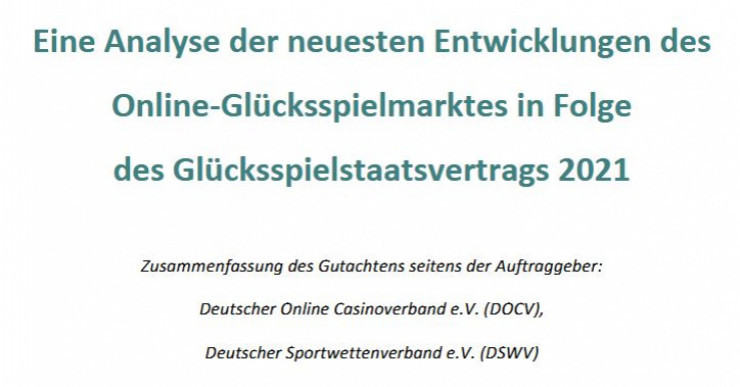Study: GlüStV 2021 canalisation plan will be missed!

The State Treaty on Gambling of 2021 (GlüStV) and its regulations are regularly the subject of heated debate. This is the case once again: a study by the University of Leipzig suggests that one of the main goals of the GlüStV, to channel players into the legal market, is being missed by a wide margin. The very restrictive course currently being pursued, with its many limitations, is making channelling much more difficult.
The State Treaty on Gambling of 2021 (GlüStV) was - and still is - intended to provide a clear legal basis for gambling in Germany. Unfortunately, it has been anything but a resounding success. Players, authorities and the gambling industry are constantly grappling with the regulations and their implications.
There has long been debate - including within the GambleJoe community - as to whether the GlüStV can achieve its goals in terms of player protection and channeling with the current approach. A new study conducted by the University of Leipzig on behalf of the German Online Casino Association (DOCV) has now cast massive doubt on whether the regulated, legal market in Germany is attractive enough for players to actually take advantage of such offers.
The study concludes that German gamers actually spend half of their time on the illegal market. It is estimated that every second minute someone is using such services. What's more: "One of the main objectives of the State Treaty on Gambling, namely to steer consumers towards the legal market, is being missed," says a press release from the DOCV. The association makes clear demands to solve the problems. Will the GGL meet them?
What is the Leipzig University study about?
Under the title "An Analysis of the Latest Developments in the Online Gambling Market as a Result of the State Treaty on Gambling 2021", the University of Leipzig took a close look at gambling in Germany. The study was commissioned by the German Online Casino Association (an association of leading online gambling companies licensed in Germany) with the participation of the German Sports Betting Association (DSWV).
According to the DOCV, the main objective is to "contribute to the evaluation of the status quo and the further development of the State Treaty on Gaming in accordance with the associated objectives of the federal states". To this end, the University of Leipzig, under the direction of Professor Gunther Schnabl and Taiki Murai, has "for the first time analysed a large number of German-language online gambling offers from other EU countries and offshore which do not comply with German regulations".
DOCV: The restrictive approach of the GlüStV restricts channelling
The studies by the University of Leipzig reveal major differences: Important goals of the federal states that are to be achieved with the GlüStV of 2021 and the real situation differ considerably. For example, the plan is actually to strengthen the legal market in Germany through regulation. However, this is clearly not the case. The study shows: "Half of the time spent by German players is currently spent on illegal online gambling services," the DOCV stated in its press release.
DOCV President Dr Dirk Quermann says of this development:"Consumers are currently spending every second minute in the illegal market without player and youth protection, with devastating consequences."
The DOCV calls for drastic changes to the GlüStV
In the press release, the DOCV not only takes a clear position on the situation suggested by the study, but also calls on the responsible Joint Gambling Authority of the Federal States (GGL) to take "urgent action". It points out that Germany is lagging behind other European countries in terms of the negative development highlighted: "While the online gambling market is growing significantly in France, Italy, the UK and other European countries, this market is said to be declining in Germany according to the market survey carried out by the federal states to date."
The main blame for the apparent failure of the canalisation plan lies with the many restrictions that the GlüStV of 2021 will impose on gambling in Germany.
Dirk Quermann dazu:„Der restriktive Ansatz des Glücksspielstaatsvertrages in den Bereichen Spielangebot und Spielverlauf schränkt jedoch die Kanalisierung ein. Online-Glücksspiel ist ein dynamischer Markt und dynamische Märkte brauchen eine dynamische Regulierung. Nur eine flexible Regulierung gewährleistet eine Lenkungsfunktion und die Erreichung der Ziele des Staatsvertrages - insbesondere des Kanalisierungsziels“.
Quermann also stresses in his statement that now is the time for change. This is the only way to effectively address the difficulties that have been identified. It is important to "optimise the functioning of the treaty", says the DOCV president.
But the DOCV is even more specific and makes clear demands:
- First, the GGL's approval processes will be massively accelerated. This is to be achieved by increasing the number of staff and using external resources.
- The GGL should also make use of the powers granted to it under the GlüStV to change the betting limits for virtual machines or to expand the range of sports betting services on offer in order to better meet players' expectations.
- The last demand concerns the prosecution or exclusion of illegal providers. According to the DOCV, it is important that all enforcement options are used.
Conclusion
Image source: Screenshot von https://casinoverband.de/fileadmin/user_upload/Pressemitteilungen/Zusammenfassung_Schnabl_Studie.pdf

0 Comments to: Study: GlüStV 2021 canalisation plan will be missed!
write a commentOur community thrives on your feedback - so let us know what you think!
Would you like to write comments on GambleJoe yourself? Then just create a GambleJoe User Account.